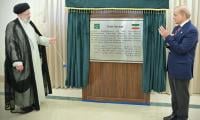Underlining the need to increase industrialisation in the country, senior economist Dr Kaiser Bengali suggested during a consultation meeting on Saturday that the Pakistan Industrial Development Corporation (PIDC) should be revived to achieve the purpose.
Speaking about the challenges to the country’s economy during the National Labour Council’s meeting at the Piler Centre, he said agriculture and industry are the main pillars of Pakistan’s economy, but there has been meagre growth in both the vital sectors during the past 25 years.
Dr Kaiser, who has served as adviser to the chief ministers of Sindh and Balochistan, stressed the need to launch a socialist movement because, he said, the elite rulers will not solve the people’s problems.
“Our population growth rate is 2.5 per cent and labour force increase rate is 3.5 per cent, so the GDP should grow more than 3.5 per cent a year. If the GDP growth is less, it means the per capita income is reducing.”
Referring to his recent study on the 25 years of Pakistan’s economy, he said there has been an average growth of only one per cent in four major crops — rice, wheat, sugar cane and cotton — while growth in minor crops like pulses and vegetables remained at 1.5 per cent, which is less than the population growth rate.
The country can face a major crisis of food shortage in such a situation, he said, adding that cotton is a fundamental crop on which our entire textile industry depends, but its production has also reduced.
“On an average, the overall growth of the industry remained at 4 per cent during the last 25 years. For the last 25 years, our exports have increased by 7.5 per cent and imports by 11 per cent.
“Till 2002, for every $100 worth of exports, there were imports of $121, but now the ratio stands at $100 to $230. The markets are flooded with imported goods, including food items. Many local industries have closed down, and imported goods have replaced local productions.”
Skilled labour
Dr Riaz Shaikh, head of social sciences at Szabist, said that skilled labour force is not developing in Pakistan. “Labour force is working under precarious conditions. Pakistan exports manpower to the Middle East, but they remain unskilled despite spending many years.
“Remittance money has actually turned Pakistan into a consumer society, where no industry is developed. There is no innovation in the industry and agriculture sectors. Our trade with neighbouring countries has, in fact, reduced. Our trade with India is less than $1 billion, while our trade with Afghanistan that was over $2 billion has now reduced to $300 million.”
Economic policies
Piler Executive Director Karamat Ali said workers suffer due to the government’s economic policies. “Out of 6.5 crore workers, only one per cent are registered.”
Quoting the International Labour Organisation, he said there are 7,500 trade unions and 1,309 collective bargaining agents (CBAs). “On an average, six to seven trade unions exist in each organisation, meaning the CBAs are not so effective.”
He said that 80 per cent of the people are working either in the informal sector or their working conditions are informal, adding that 70 to 80 per cent of the people are employed through contract or third-party contract system, so they cannot join trade unions.
An aerial view of Karachi city. — AFP/FileCelebrating ShakespeareThe National Academy of Performing Arts is...
A representational image showing people taking part in a plantation drive in Pakistan. — UNAP website/FileKARACHI:...
A representational image of a gavel in a court. — Unsplash/FileAn anti-terrorism court has issued bailable arrest...
Two employees while working on a gas pipeline in an unidentified location. — AFP/FileThe SSGC disconnected gas...
Murtaza Bhutto brother of the then prime minister and Pakistan Peoples Party chief Benazir Bhutto . — Facebook/Mir...
CEO, KWSC Engineer Syed Salahuddin Ahmed pose for a photo at the KWSC office this image was released on March 12,...







